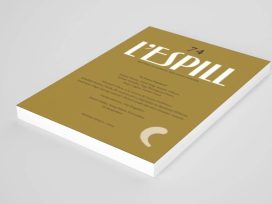Abstracts for L'Espill 24 (2006)
Christiane Stallaert
“Casticism” and Nazism, a European genealogy?
Although there are very few authors who have reflected on the language of “casticism” and its relationship with the Spanish ethno-genesis process, we can say that the transposition of the analysis, concepts, and philological reflections from Holocaust studies towards the realm of the Inquisitorial and “casticist” Spain reveals astonishing resemblances. The parallel between the Inquisition mentality and praxis and the vision and proceedings of Nazism is very illuminating about the paradoxes and limits of the historical conscience of a secular and pluralist Europe when confronted with the identity radicalisms of the present day.
Vicenç Villatoro
Shrinking glasses
The Castilian view of Catalan culture is filtered through a political and historical shrinking glass that distorts all contents. In the history of the relationship between the two cultures, there have been moments of intellectual commiseration (when the Catalan language and culture was persecuted) and other moments of high disaffection or scorn (when Catalan culture developed with some normality). Nowadays, the glasses are so dark that one can see nothing, or, if anything, only very little, unjust, shrinking things.
Antoni Martí Monterde
Walter Benjamin and the aura of autobiography
Walter Benjamin relates his passion as a collector, first of all of books and quotations; the sentiment of loss; the experience of exile; and the quest for autobiography. He translated Proust into German. A number of his works are autobiographical and he has developed a highly subtle reflection about the interaction between one’s life, the signs in the streets, history, and literature. One can translate the concept of aura from art into autobiography and in this way illuminate some neglected aspects of Walter Benjamin’s life and work.
Anaclet Pons, Justo Serna
Microhistories
Books on history have, for some time, been populated by anonymous heroes (millers, peasants, widows) who explain life histories, reminiscences, or opinions about the making of the cosmos. Some of these works, not about kings, generals, and great men, but about ordinary men and women, are now classics of microhistory. Authors like Carlo Ginzburg, Natalie Zemon Davis, and Robert Darnton are now well-known figures in this way of reshaping the ideas and feelings of the ordinary people of the past.
Published 19 March 2007
Original in English
Contributed by L'Espill © L'Espill Eurozine
PDF/PRINTNewsletter
Subscribe to know what’s worth thinking about.



